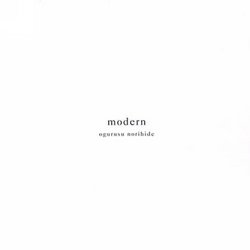| All Artists: Ogurusu Norihide Title: Modern Members Wishing: 0 Total Copies: 0 Label: Carpark Records Original Release Date: 1/1/2003 Re-Release Date: 3/18/2003 Genres: Dance & Electronic, Special Interest, Pop Styles: Electronica, IDM, Techno, Experimental Music, Dance Pop Number of Discs: 1 SwapaCD Credits: 1 UPCs: 677517002522, 677517002553 |
Search - Ogurusu Norihide :: Modern
CD DetailsSimilar CDs |
CD ReviewsJunkmedia.org Review junkmedia | Los Angeles, CA | 03/19/2003 (3 out of 5 stars) "With his well-received debut, Humour (a compilation of the self-released EPs, Study and I), Japan's Ogurusu Norihide explored a clear and restrained musical aesthetic based on simple repetitive melodic patterns comprised of a scant few musical elements -- acoustic guitar, piano, subtle electronics. It's tempting to ascribe Norihide's predilection for simplicity to his formal training as a Shinto priest, but in reality, with its rich, lyrical melodies, his music is as much related to the evocative folk-tronica of fellow Carpark artist Greg Davis as it is to formal Shinto aesthetics (not that I'm an expert on the latter, mind you). Though Norihide may be less interested in exploring the playful, childlike melodies favored by Davis and other acoustic-electric adherents, his approach is far from ascetic.On Modern, Norihide uses the same list of ingredients and follows a similar recipe as he did on Humour. Indeed, for much of the record, from the opening track "7:07" (as with his previous work, there are no titles as such, just indications of duration) with its lightly processed piano riff and soft-tap percussion to the dreamy guitar-based closer, "1:04", Modern is a lovely, refined, and lightly experimental pop record, full of simple yet evocative melodies.As on Humour, however, he does occasionally stray from the straight and narrow, though these points of diversion are essentially logical extensions of his basic musical formula. Humour was, in fact, very much a bifurcated record, comprised as it was of two separate EPs. This division was the primary weakness of his American debut, as the I section seemed to drift aimlessly, favoring such a minimal approach as to almost eliminate melody from the equation while generally failing to provide a sense of unity and flow in its place.Modern does not have such an obvious Achilles heel. As with the I section of Humour, there are moments where Norihide pushes his technique to its limit. In this case, on tracks such as "10:05" it is to better effect, as he seems -- to use an annoying but apt cliché -- to explore the spaces between the notes. The album's greatest deficiency is that there are few similar moments on Modern and the album turns blandly pleasant, lacking in either tension or drama. Susanna Bolle
Junkmedia.org Review" |


